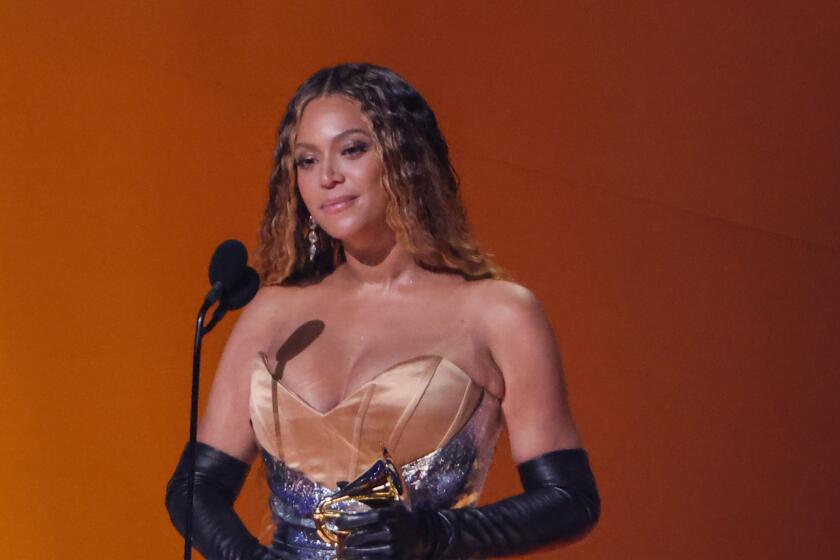Could ‘The Last of Us’ finale beat the Oscars in the ratings? We break down the numbers

- Share via
The fungal zombies are coming for the Oscars.
In a programming matchup that’s certain to create an agonizing Sophie’s choice for many TV viewers — and may cause some agita among leaders of the motion picture academy — the finale of HBO’s post-apocalyptic hit series “The Last of Us” is scheduled for the same night as this year’s Academy Awards, March 12.
Yes, while HBO stepped aside in deference to this Sunday’s Super Bowl, shifting the upcoming fifth episode of “The Last of Us” up to Friday, the network decided to go ahead and play chicken with the Oscars.
So what happens when you pit Hollywood’s biggest night against the climax of the year’s most buzzed-about show — other than perhaps sparking some arguments over who gets control of the remote? Which major televised entertainment event will come out on top?
In Sunday’s episode, the HBO series introduces two characters from the game, Bill and Frank — and changes their story completely. Here’s why.
Let’s break down some numbers.
As everyone knows, ratings for the Oscars have been steadily declining for years, as movies have been displaced from the center of the cultural conversation and the entertainment landscape has grown ever more fragmented. Last year’s Oscars drew an average of 15.4 million viewers, up 56% from the previous year’s pandemic-dampened ratings disaster but still the second-lowest viewership in the telecast’s history, and far below the more than 40 million who tuned in just nine years ago.
With a handful of bona fide blockbusters in the best picture mix this year, including “Top Gun: Maverick,” “Avatar: The Way of Water” and “Elvis,” Oscar insiders are hoping that the show will draw in more casual moviegoers who may not otherwise feel compelled to watch the show.
The high-water mark for Oscar ratings — 55.3 million viewers, reached in 1997 — came in a year that was dominated by James Cameron’s “Titanic,” then the biggest box office hit of all time. For the first time ever, this year’s best picture race includes two films that have topped $1 billion globally: Cameron’s “Avatar” sequel and “Top Gun: Maverick.”
Academy leaders, who have tried everything from proposing (and then scuttling) a “best popular film” award to launching a Twitter-voted fan-favorite prize to boost viewership for the Oscars, may have reason to be optimistic.
While ratings for awards shows across the board have been generally trending downward, Sunday night’s Grammys averaged 12.4 million viewers, up 30% from last year, according to Nielsen, making it the most-watched Grammy telecast since 2020. Perhaps that is a sign that awards shows may be rebounding off their ratings lows.
If this year’s Oscars were to receive a similarly sized bounce, it would pull in roughly 20 million viewers. That would put it within striking distance of 2020’s prepandemic telecast, which saw 23.6 million viewers tune in to watch “Parasite” win best picture.
As for “The Last of Us,” viewership for the series has grown steadily since its debut, as strong reviews — and a heartbreaking and much-discussed third episode — have continued to expand its audience well beyond fans of the original video game.
Sunday night’s fourth episode of the series pulled in 7.5 million viewers across linear broadcasts and the HBO Max streaming platform, according to the network, up 17% from Episode 3 and a whopping 60% above the series debut in January.
If “The Last of Us” continues to grow at that rate, picking up new fans like so many Cordyceps-infected victims — and if the Oscars has an abysmal night, flirting once again with the record-low viewership of 9.8 million it hit in 2021 — things could get interesting.
The redemptive moment of Beyoncé finally winning album of the year never came, and as beloved as Harry Styles might be, the show ended on a low note.
Still, realistically speaking, “The Last of Us” will probably not pull in enough viewers to pose a real threat to the Oscars. The most-watched show in HBO history is 2019’s series finale of “Game of Thrones,” which drew in 19.3 million viewers — a tally that took that series 9 years to build and one that “The Last of Us” is highly unlikely to reach in its initial season.
That said, while the Oscars will probably be able to claim a ratings victory that evening, with “The Last of Us” available for delayed viewing via HBO Max, the series finale’s total viewership could well end up topping that of the Academy Awards. Through its first few episodes, the show has averaged more than 20 million viewers including those who streamed it in the week after it aired. For as long as it remains on a broadcast network, the Oscars just gets one shot to capture whatever audience it can as a live event before quickly becoming yesterday’s news.
In the end, the fact that an awards show that once claimed to draw a billion viewers globally (perhaps with some exaggeration) need even concern itself with competition from a mere cable series shows a sign of how dramatically the landscape has shifted.
The zombies may not get them this year. But the Oscars are not out of the woods.
More to Read
The complete guide to home viewing
Get Screen Gab for everything about the TV shows and streaming movies everyone’s talking about.
You may occasionally receive promotional content from the Los Angeles Times.









